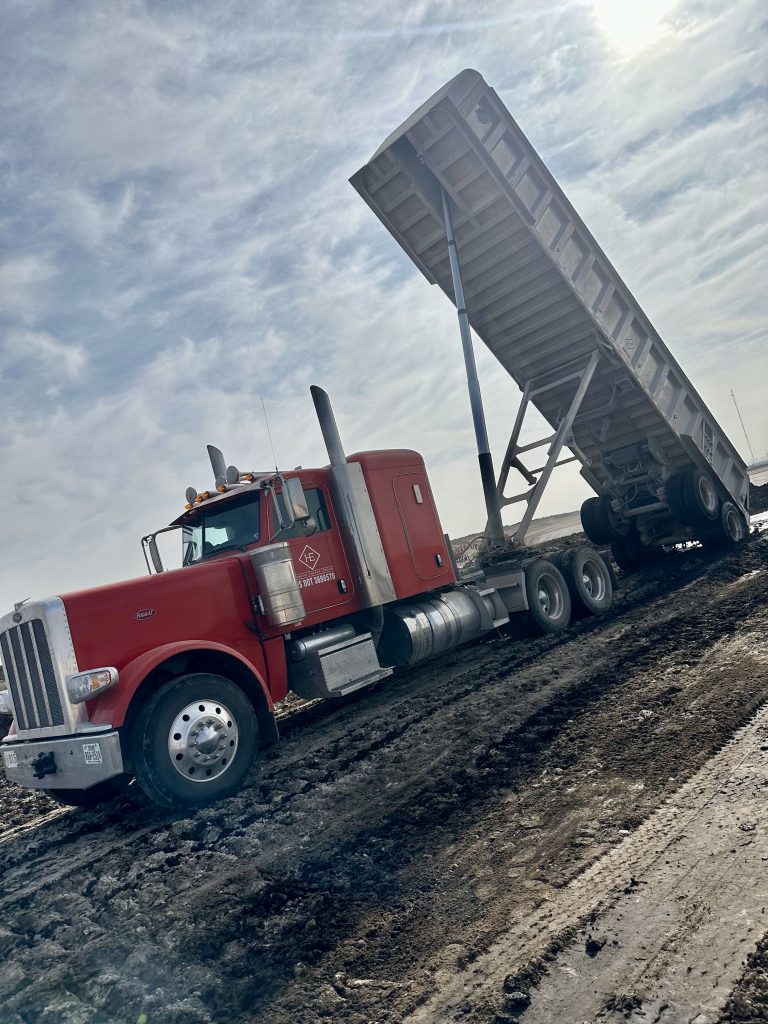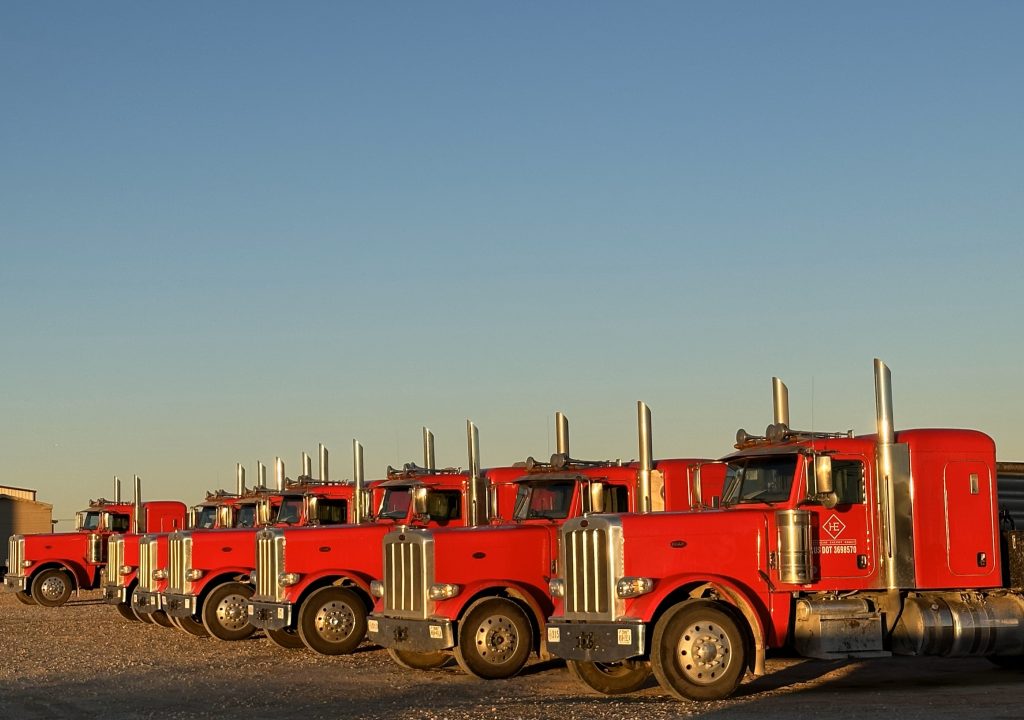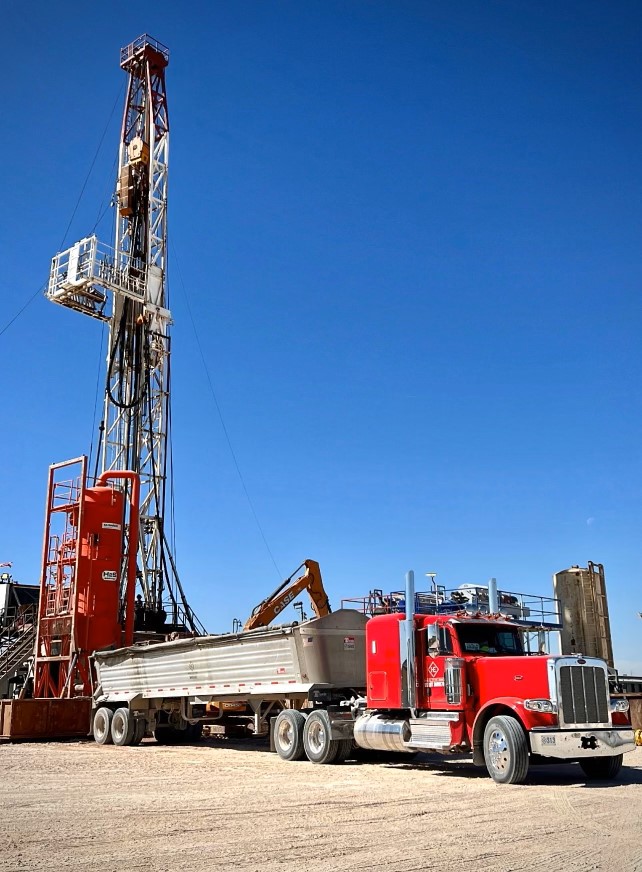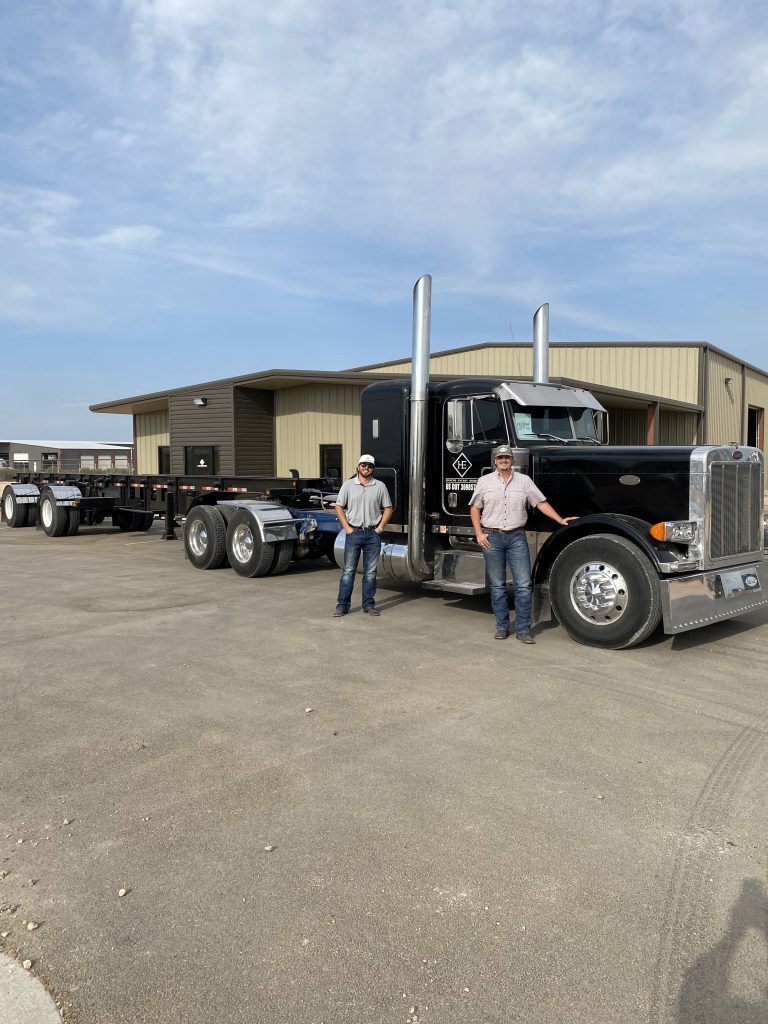The oil and gas industry is no stranger to challenges, which historically have been overcome through innovation and collaboration. However, working together to develop solutions is not an option when the threat surfaces from within. With the Permian Basin so enriched by its vast oil and gas assets, the trucking industry should be capitalizing on a stocked pool of opportunity. Just the same, multiple trucking companies servicing the area slash prices to secure business, leaving other providers scrambling to find a balance in offering a quality service at an acceptable and competitive price.
Parker Dorsey and his partner, Cameron Moore, founded Honcho Energy Group during the aftermath of the COVID pandemic. While they thought it was a challenge to piece together a fleet of trucks during that time, the current price war has posed a much more complex reality.
“My partner and I started Honcho in 2021 when you couldn’t find equipment,” said Dorsey. “We managed to secure four used trucks and pushed forward getting business. Those were challenging times, but now we are trying to compete with companies who cut trucking prices so low, I do not know how they can operate.”
According to Oliver Chapa of Chapa Unlimited LLC, the attempt to compete can quickly take its toll. As vice president, he helps manage his company’s hotshot operations that consist of 11 trucks and trailers. While the Permian appeared to be a hotbed of opportunity, his company eventually found greater and more stability hauling drill pipe between Laredo and San Antonio, Texas.
“Between the cost of fuel and cutthroat pricing, we found the opportunity available to our business could not turn enough profits to justify trying to compete with all these companies charging next to nothing just to get the business,” said Chapa.
While some companies have succumbed to the crunch, Honcho has successfully navigated these challenging times and found ways to counteract the growing trend of price slashing. While a strategy might slightly differ for each trucking provider, Dorsey and his partner have analyzed their company’s performance and remain steadfast in how it operates under this financial pressure.
Diversifying business
There is much to be said about finding a niche or sticking to your expertise. While that might yield success in some areas, Dorsey believes offering a basket of services is critical to establishing and maintaining a place in the trucking industry’s Permian Basin footprint.
“When we started Honcho, we operated our eight trucks six days per week for seven months,” said Dorsey. “All we did was haul off oil-based cuttings to disposal.”
As the company became profitable, Dorsey and Moore invested in their fleet with the notion of expanding not only their reach but also the services they provided. Honcho now offers an array of trucking services that include roll-off and end dump trailers, as well as winch trucks. Further expansion enabled Honcho to offer cutting, open-top, and vacuum boxes to its customers.
“We now have 18 trucks and trailers,” said Dorsey. “We do a great deal of business on the drillout side with hauling material off to disposal.”
That service expansion has enabled Honcho to answer multiple areas of need within the Permian Basin. With more services, the company secures a better opportunity to gain business. This practice makes companies more competitive by meeting customer needs at multiple levels. Companies needing one service at a precise moment could see how a more diversified trucking company could offer additional services and solutions. Dorsey credits the power of one-stop shopping gained by diversifying the business with keeping Honcho relevant within the Permian Basin.
Investing in Equipment
For Dorsey, it’s a satisfying stroll down nostalgia lane—this business of hearkening back to those early years—but he quickly shifts back to the present. Proud though he may have been of the start he got with that used fleet, Dorsey reasons that it takes money to make money. Profits earned from successful businesses must be effectively managed. If a trucking firm is going to avoid being waylaid unrealistic pricing, some of its profitability must be directed at new and reliable equipment.
“You can’t get complacent,” said Dorsey. “You need to continue to analyze what works and keep that momentum moving forward.”
Dorsey and Moore harnessed that spirit and invested deeper in Honcho as soon as the opportunity surfaced. Capitalizing on a good run of business, the pair increased the size of its fleet and, as the company was able, new trucks were purchased, and those used components were replaced.
“The trucks have to be running and on the road to make the company money,” said Dorsey. “By purchasing new trucks, we can ensure our fleet is always operational to service our customers any time they call.”
According to Dorsey, companies that adopt cutthroat pricing can find themselves compromising their quality of service. It’s inevitable. Companies who slash prices can not afford to pay notes—nor purchase new equipment—because they are not turning a profit or, if they run their operations with new equipment, live with the grim reality they will not be able to maintain those operations for long.
For his own part, Chapa added that another factor influencing this harsh reality is that while companies attempt to invest in themselves, the going rates typically do not change. As a result, any growth must reside within the constraints of a tight market.
“Rates usually do not increase,” said Chapa. “The only thing that does change is the cost of diesel, which seems to only increase.”
Dorsey adds that equipment investment does not stop with the purchase; instead, it must be maintained by remaining vigilant in caring for and servicing that equipment. While some might be dismissive of such rigors, Dorsey, for his own part, reasons that immense value comes from not only maintaining that equipment’s functionality but also its appearance.
“We focus heavily on fleet maintenance,” said Dorsey. “The trucks and equipment make us money. Our trucks are regularly cleaned and detailed, and each driver must complete a detailed inspection of the trucks they drive. This maintains the life and appearance of the fleet, creating a brand and making it look like a professional company. We only support the pricing we demand as a professional trucking company.”
Dorsey questioned how companies that fail to follow this practice remain viable. While cheap pricing might attract more business, the inability to properly operate one’s trucking business will eventually come home to roost in the form of insolvency.
It takes a village
Having the absolute best in equipment is a significant pillar in justifying higher-than-slash type pricing. Still, without qualified personnel to navigate them to and from customer locations, the motor is turning, but the truck is not moving. While new and dependable equipment can be obtained through competitive pricing that warrants profitability, Dorsey explained the same thought process applies to the people who operate the equipment in the trucking industry.
“Our drivers are critical to the success of Honcho,” said Dorsey. “All our people are important, especially Claudia Ornelas in our office. Our drivers move our trucks up and down the road while she holds everything together.”
According to Dorsey, Honcho only seats the best drivers in the cabs of its trucks. This ensures safe operation while trucking the customer’s material to and from its location. As another critical piece in Honcho’s blueprint of securing victory in the price wars, Dorsey maintains that good drivers enable success. Those companies that charge bare-bone fees cannot afford to pay drivers who can be fully trusted to operate trucks to the standard Honcho sells its services.
“We pay top dollar for drivers to keep them in the seat,” said Dorsey. “They will not work for companies that will not pay what they can get elsewhere. This is just another example of how competitors who cut prices so low cannot maintain successful operations.”
While the Permian Basin commands a large part of its workforce from individuals who reside outside the area, Honcho broke from the norm of the standard workday and work week. To keep drivers for the long haul, scheduling took on a new meaning.
“Honcho is very fortunate to remain in demand and service our customers continually,” said Dorsey. “We are remarkably busy and could work around the clock. We are a 24/7 service company, but you cannot keep drivers if you work them into the ground. As a result, all our drivers work a three-week on and one-week off rotation.”
While this scheduling offers the opportunity to keep drivers revived and healthy, it also allows Honcho to draw from a more extensive selection of drivers instead of only drawing from a local talent pool. People around the country have found work in the Permian Basin, and Honcho identified the value in this statistic.
Fitting the pieces together
Honcho has remained competitive and has not suffered client loss. However, that is due to its having been established in the Permian Basin before companies accelerated their price-slashing strategies. Honcho had already begun reinvesting in its fleet and people, which provided an edge.
Companies now attempting to embrace the Honcho blueprint could weather the storm of losing some business before companies engaging in price cuts finally realize the loss in profitability. Customers must find a new service provider when they can no longer support their operations. At that point, those trucking companies still operating can demand competitive rates, but only with quality equipment and professional personnel.
According to Chapa, the holding out and waiting for other companies to fail takes time and should not be necessary. If trucking companies all charged competitive rates, he feels each would gain a profitable piece of market share.
“Companies need to stand their ground and charge realistic prices,” said Chapa.
Regardless of the opinions of how the industry should conduct itself, those wanting to operate within the Permian must utilize tactics that ensure survival. While difficult, companies must focus on the state of the industry and what it takes to compete, and not focus on an idealistic state.
“The trucking industry can have its ups and downs,” said Dorsey. “You have to think on the fly, but if you can provide a professional and quality service, you can retain customers for the long haul.”
Nick Vaccaro, owner of Vaccaro Group LLC, services the energy industry as an HSE consultant and freelance writer. A contributor to numerous industry publications, Vaccaro holds a BA in photojournalism from Loyola University. He can be contacted at 985-966-0957 or nav@vaccarogroupllc.com













